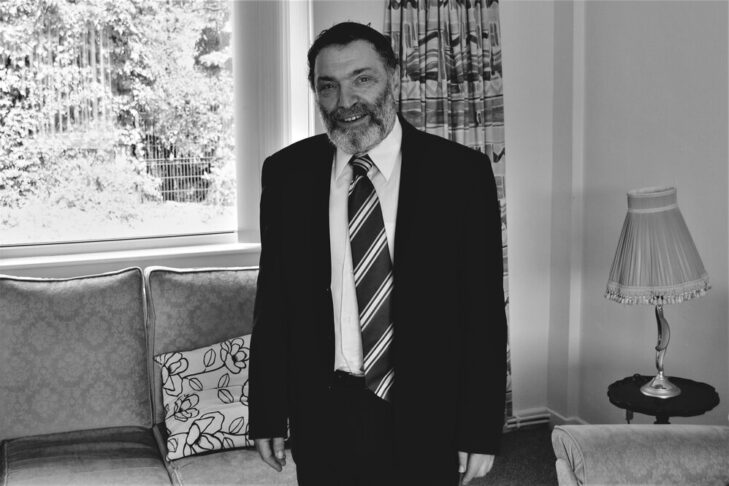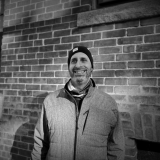In the summer of 2018, sponsored by a grant awarded to my synagogue, Providence’s Congregation Beth Sholom, I traveled to Ireland and Northern Ireland to learn about Jewish life and contemporary literature relating to Jews there.
I was accompanied by my brother, Amir Afsai, a journalist who teaches Hebrew at Sts. Tarkmanchatz Armenian School in Jerusalem and has some familiarity with conflict zones. Like Jerusalem, Belfast is a city marred by political and sectarian strife, and Belfast’s Jewish residents cannot avoid its engrained societal divisions.
One of the best anecdotes illustrating Belfast’s long-standing social divisions, as well as the sometimes uncertain position of its Jews, is told by the actor Harry Towb in his 1984 BBC2 documentary Odd Men In, which recounts the Jewish community’s history and Towb’s experience growing up in the city:
I used to come here in the 30s, to the Jaffe School, for early evening Hebrew classes. And one dark December night, I emerged through the gates and I was confronted by three youths. And the tallest of the trio got hold of the lapels of my coat and he stuck me up against the school railings. And he said, “Hear boy! What foot do you kick with?”
Now, I knew what he meant. He meant: was I a Catholic or was I a Protestant? What I was at that particular moment was a terrified ten-year-old. There was only one thing to do and that was to brazen it out with the truth, and I said, “Well…I…I…I don’t kick with either foot. I’m a Jew.”
And there was a complete and utter silence.
And the big fellow looked around at the other two and he said, “Hear! Do you hear what your man says? He says he’s a Jew! Well hear boy, tell us this: are you a Protestant Jew or a Catholic Jew?”
You know, that’s not a music hall joke. It actually happened. And I have a hunch it was quite a common happening around here—common to an uncommon people.
Towb’s encounter took place in the 1930s, but Belfast’s current Jewish residents cannot avoid the city’s social divisions either. Its few hundred Jews remain an uncommon people. Over the past several decades, many Catholics and Protestants in Northern Ireland have taken to using the Arab-Israeli conflict as a proxy for their own political and sectarian tensions. More Palestinian than Irish flags decorate various Catholic Belfast neighborhoods, while in Protestant areas there are murals in support of the state of Israel. Some of these murals are frequent targets of vandalism by anti-Israel Catholic activists.
This fixation with Israel was also apparent during guided tours my brother and I took after arriving in the city. These tours were already fully booked that day, but when I explained that I was in Belfast to write about its Jewish community and was also seeking some understanding of the city’s broader historical context, the guides and organizers of the Belfast Free Walking Tour and the Belfast Political Tour made special arrangements for us to join.
The first part of the Belfast Political Tour was led by an IRA ex-prisoner and its second part by a retired Northern Ireland policeman, each presenting their narrative of the conflict without any pretense of objectivity. At the start of the tour, the IRA ex-prisoner asked the assembled group where people were visiting from. A number of countries were named. One couple said they were from England, and my brother said he was from Israel. The guide then stated: “We have people here from England and Israel. I do not mean to give you offense with what you will be hearing today. I am only describing the truth.”
Israel was not mentioned even once by the guide during the rest of the tour, but the Jewish state has somehow become such a fixture of Northern Ireland’s conflict that the IRA ex-prisoner instinctively grouped it with the United Kingdom in his introduction. The retired Northern Ireland policeman, for his part, was visibly delighted to find out that someone from Israel was on his tour.
When my brother and I attended services at the Belfast Jewish Community—Northern Ireland’s last remaining synagogue—and met the Rev. David Kale, it was only his second Shabbat as the community’s religious leader. He and his sister, Avril Kale—a retired pharmacist and, more recently, a continuing education university teacher—had been in Belfast for just 10 days. The congregation was tremendously warm and welcoming to us and Kale gave me the honor of delivering the Shabbat morning discourse at the conclusion of the services. I spoke on the topic of Benjamin Franklin’s influence on Judaism.
The following day, I visited Kale at his home, which is a several-minute walk from the Belfast Synagogue and is where its previous religious leaders have also lived.
The edited exchange below is drawn from that initial conversation at his Belfast home, from a roundtable discussion later held at the synagogue with Kale and other members of the congregation, and from the ongoing email correspondence I have had with him. I had hoped for another chance to see each other in person by now, but this had been hindered by the pandemic.
You are a reverend, or minister. Neither of these are titles that Jews today in America would tend to associate with synagogue leadership.
A reverend is an experienced and qualified person who is authorized by the chief rabbi of the United Kingdom and Commonwealth to carry out all the duties of a rabbi, or to act as hazzan [i.e., cantor] of a shul [i.e., synagogue], without having semicha [i.e. rabbinic ordination]. A reverend carries out all the duties that a pulpit rabbi in America would carry out. Being a trained hazzan also carries with it the title of “reverend.” There are very few reverends today. The position is going to become extinct.
What led you to enter the ministry?
I wanted to become a rabbi from an early age. My maternal grandfather was the rav [i.e., rabbi] of Machzikei Hadas in London’s East End. He came from Lithuania. My paternal grandfather came from Lodz, in Poland, and was a founding member of Ilford Federation Synagogue. I attended Etz Chayim Yeshiva in Golders Green, in North West London, and trained privately to become a hazzan, a ba’al koreh, and a ba’al tekiah [i.e., shofar blower]. I have been a ba’al koreh and ba’al tekiah since the age of 13.
I grew up in Bournemouth, a seaside resort, which had about six big kosher hotels catering solely for Jewish people, similar to the hotels that were in the Catskills in America. Every hotel had its own shul and Shabbat services. Sometimes they had weekday services, as well. The mashgichim [i.e., kosher food supervisors] were also retired hazzanim [i.e., cantors], and some gave derashot [i.e., sermons], too. When these men went out of town on holiday, they needed someone to lead prayers and lein [i.e., chant from the Torah] in their place, and my late father, alav hashalom [i.e., peace be upon him], would volunteer me to substitute for them. When I was 15, I started shofar blowing at one of these hotels. I started leining [i.e., chanting from the Torah] at age thirteen, and leining became my forte.
Yet you did not end up becoming a rabbi.
My parents did not want me to have a career of a hazzan or a rabbi, but to have a profession. Consequently, I trained and then practiced for many years as a solicitor, which in America you would call an attorney. However, I regularly substituted for rabbonim [i.e., rabbis] in London shuls when they went on vacation. In addition, I regularly undertook rabbinical duties for the Yomim Noraim [i.e., the High Holidays: Rosh Hashanah and Yom Kippur].
The Troubles drastically reduced Northern Ireland’s Jewish population and there may now be as few as 300 Jews here, most of whom are not young. What drew you to minister to Belfast’s synagogue?
I consider it to be vital to keep alive all shuls, no matter where they are situated. In my personal opinion, it is so hard to build a shul. It is very easy to close one down. Years ago, Northern Ireland had several shuls. It is now down to just one. This shul must not be allowed to disappear. If, God forbid, it was to disappear, there would be no Jewish representation whatsoever in Northern Ireland. I also think that we should strive to keep communities going no matter where they are situated. If we do not do this, then in the United Kingdom, for example, there will only be Jewish life in London and Manchester. If we do not support the smaller communities, they will disappear.
How has it been to be part of such a relatively small congregation, which has about 70 members?
The Belfast Jewish Community is known for being warm, kind, considerate and caring. It tries very hard to reach out and welcome all Jews. Its doors are always open to visitors, who are welcomed with open arms. Serving a small community is very important. It really needs someone to guide them more than a large community. When you are in a small community, a few people carry the burden. Everyone is needed and you feel connected. It is like a family. People look out for one another. They look forward to visitors more and hope people will move in. A small community has a lot to offer.
Were you already familiar with the Belfast Jewish Community before this position opened up?
I have known about the Belfast Jewish Community since I was a child. It has an illustrious history. One of its former rabbanim [i.e., rabbis] was Rabbi Isaac Herzog, who served the Belfast community from 1916 to 1919 [later became the first chief rabbi of Ireland, succeeded Rabbi Abraham Isaac Kook as Ashkenazi chief rabbi of British Mandate Palestine] and then became the first Ashkenazi chief rabbi of the state of Israel. Rabbi Herzog’s son, Chaim, was born in Cliftonpark Avenue in Belfast. [A plaque marking Chaim Herzog’s birthplace was taken down in 2014 after anti-Israel graffiti was sprayed on the building and objects were hurled at it.] He later became the sixth president of the state of Israel. The Belfast Jewish Community has a reputation of being a very warm community.
Northern Ireland is a region, and Belfast is a city, known for entrenched sectarian strife. Has this affected how you see your role?
I have done interfaith work for many years. The chief rabbi of the United Kingdom, Ephraim Mirvis, feels there should be interfaith work among rabbis wherever they live. This will also help to combat antisemitism and reduce a feeling of being threatened by one another. Relationships between Jewish and non-Jewish people saved lives during the Holocaust. My grandfather who was a rav in Machzikei Hadas gave tzedakah [i.e. charity] to the nuns who came around. He said and believed you must also show non-Jews respect. I have a role in interfaith work and in ensuring and promoting better understanding among the faiths. I am here to serve the Jewish population and maybe make Belfast more religiously vibrant.
Other versions of this article appeared in The Jerusalem Report/The Jerusalem Post (July 22/29, 2020) and at The Wisdom Daily (Dec. 28, 2020). For more by Shai Afsai on global Jewry, see here.
This post has been contributed by a third party. The opinions, facts and any media content are presented solely by the author, and JewishBoston assumes no responsibility for them. Want to add your voice to the conversation? Publish your own post here. MORE



